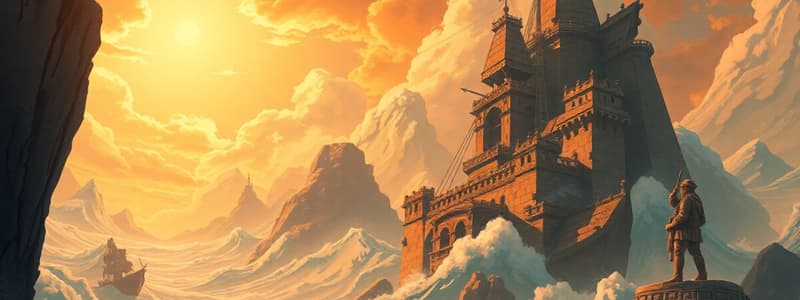Podcast
Questions and Answers
What was a common misconception about venturing too far out into the oceans five hundred years ago?
What was a common misconception about venturing too far out into the oceans five hundred years ago?
- You would encounter friendly sea creatures.
- You would discover new trade routes.
- You would fall off the edge of the earth. (correct)
- You would find new islands.
Which of the following explorers is credited with navigating the coast of Africa in the 1400s?
Which of the following explorers is credited with navigating the coast of Africa in the 1400s?
- Hernando de Soto
- Henry the Navigator (correct)
- Christopher Columbus
- Ferdinand Magellan
What significant contribution did Vasco da Gama make to Portugal in 1498?
What significant contribution did Vasco da Gama make to Portugal in 1498?
- He explored the Caribbean islands.
- He sailed to India and back. (correct)
- He discovered America.
- He led the first expedition to cross the globe.
What role did Christopher Columbus play after his first journey to America?
What role did Christopher Columbus play after his first journey to America?
Which explorer is known for traveling across the Mississippi River?
Which explorer is known for traveling across the Mississippi River?
What was one of the main goals of Francisco Coronado during his exploration?
What was one of the main goals of Francisco Coronado during his exploration?
How did Portugal and Spain initially gain an advantage in global exploration?
How did Portugal and Spain initially gain an advantage in global exploration?
Which country is remembered for exploring Canada during the era of early exploration?
Which country is remembered for exploring Canada during the era of early exploration?
What was the primary reason spices were highly sought after in the 1400s?
What was the primary reason spices were highly sought after in the 1400s?
What was a key factor that delayed other countries from joining the exploration race?
What was a key factor that delayed other countries from joining the exploration race?
Flashcards
Navigating
Navigating
The act of finding a new way to travel, involving planning, and navigation.
Who was Henry the Navigator?
Who was Henry the Navigator?
The Portuguese Prince who led early explorations down the western coast of Africa in the 1400s.
Which nation was the first to explore the world?
Which nation was the first to explore the world?
The first European nation to explore the world extensively.
Who was Ferdinand Magellan?
Who was Ferdinand Magellan?
Signup and view all the flashcards
Which nation focused on exploring the Americas?
Which nation focused on exploring the Americas?
Signup and view all the flashcards
Who was Christopher Columbus?
Who was Christopher Columbus?
Signup and view all the flashcards
Who was Hernando de Soto?
Who was Hernando de Soto?
Signup and view all the flashcards
Who was Francisco Coronado?
Who was Francisco Coronado?
Signup and view all the flashcards
Which nation is known for exploring Canada?
Which nation is known for exploring Canada?
Signup and view all the flashcards
Which other nations joined the exploration race?
Which other nations joined the exploration race?
Signup and view all the flashcards
Study Notes
Early Exploration
- Early maps were limited to Europe and contained mysteries about the world beyond
- People believed dangers like falling off the Earth or sea monsters existed outside Europe
- Early explorers braved the unknown to make discoveries and return with stories
Portuguese and Spanish Explorers
- Portugal and Spain were early leaders in exploration
- Prince Henry the Navigator led Portuguese explorations down Africa's west coast in the 1400s
- Vasco da Gama sailed around Africa to India, controlling spice trade in 1498
- Ferdinand Magellan led the first circumnavigation of the globe (1519-1522)
- Spain focused on exploration of the Americas
- Christopher Columbus led Spanish voyages to the Americas, colonizing the New World
- Hernando de Soto crossed the Mississippi in 1541
- Francisco Coronado explored parts of the southwestern US in search of gold (1540)
British and French Explorers
- Britain and France later joined the exploration race
- Jacques Cartier explored northeastern Canada (Newfoundland and Quebec) in search of a route to Asia (1534)
- Samuel Champlain explored Canada, trading with natives in the 1600s
- Captain James Cook explored the Pacific, locating Hawaii, Australia, and New Zealand in the 1770s
- Robert Scott explored Antarctica and died on an expedition in 1912
Studying That Suits You
Use AI to generate personalized quizzes and flashcards to suit your learning preferences.




